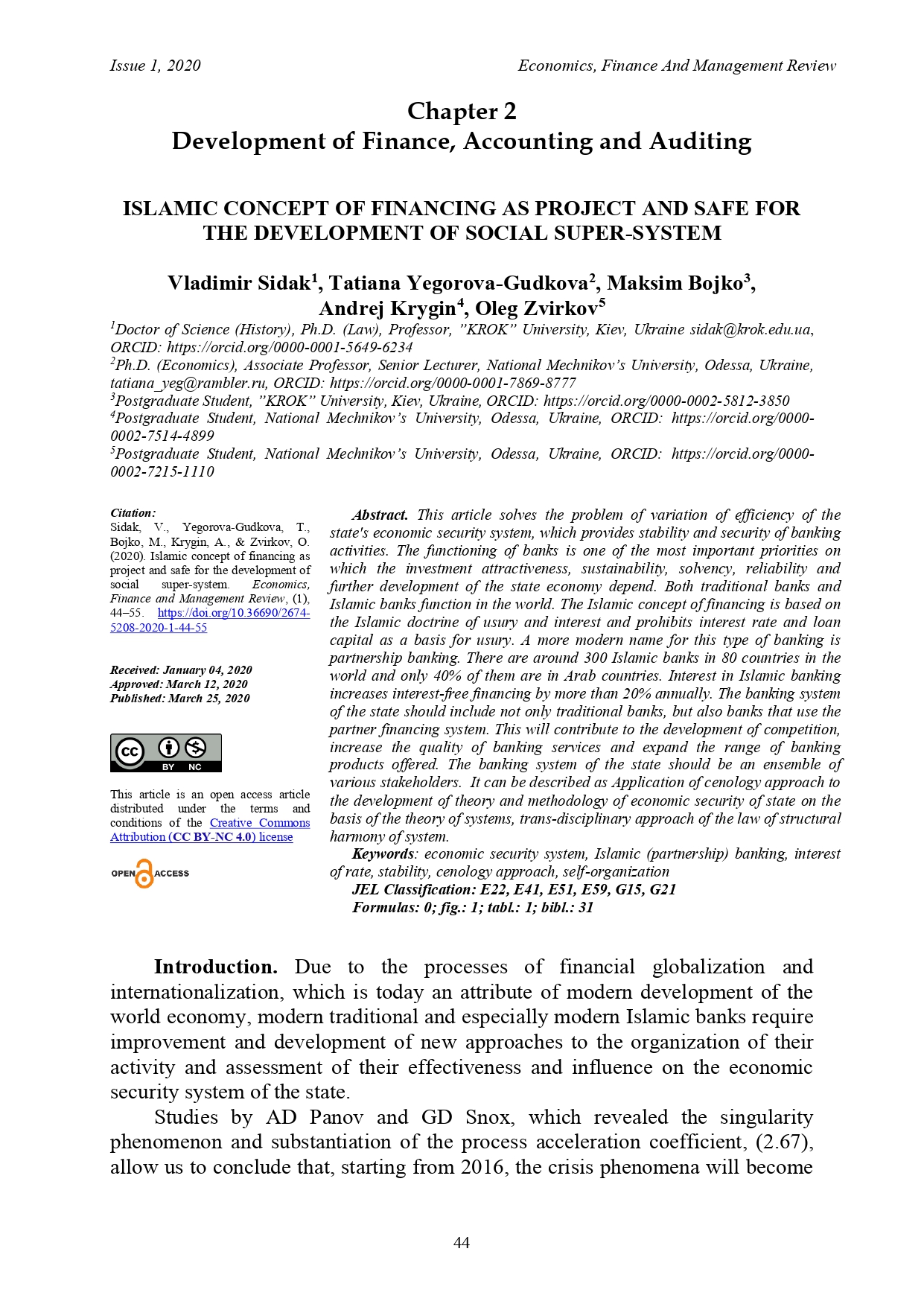ISLAMIC CONCEPT OF FINANCING AS PROJECT AND SAFE FOR THE DEVELOPMENT OF SOCIAL SUPER-SYSTEM
DOI:
https://doi.org/10.36690/2674-5208-2020-1-44-55Keywords:
economic security system, Islamic (partnership) banking, interest of rate, stability, cenology approach, self-organizationAbstract
This article solves the problem of variation of efficiency of the state's economic security system, which provides stability and security of banking activities. The functioning of banks is one of the most important priorities on which the investment attractiveness, sustainability, solvency, reliability and further development of the state economy depend. Both traditional banks and Islamic banks function in the world. The Islamic concept of financing is based on the Islamic doctrine of usury and interest, and prohibits interest rate and loan capital as a basis for usury. A more modern name for this type of banking is partnership banking. There are around 300 Islamic banks in 80 countries in the world and only 40% of them are in Arab countries. Interest in Islamic banking increases interest-free financing by more than 20% annually. The banking system of the state should include not only traditional banks, but also banks that use the partner financing system. This will contribute to the development of competition, increase the quality of banking services and expand the range of banking products offered. The banking system of the state should be an ensemble of various stakeholders. It can be described as Application of сenology approach to the development of theory and methodology of economic security of state on the basis of the theory of systems, trans-disciplinary approach of the law of structural harmony of system.
Downloads
References
Afontsev, S. (2020), “Jungle of transnational business”. Retrieved from: http://news.putc.org/news/budushhee_tnk_tendencii_i_scenarii_dlja_mirovoj_politiki/2012-08-22-12834.
Bekkin, R. I. (2010), “Islamic economic model and modernity”, Publishing house Marjani, Moscow, Russia, р. 16.
Budanov, V. G. (2006), “On the methodology of synergetics”, Questions of philosophy, 2006, №5, p. 80.
Fufaev, V. (2006), Economic coenoses of organizations, Center for System Studies, Moscow, Russia, 32 p. (Russian).
Chan, C. (2020), “Malaysia: the Islamic financial capital of the world”, Globalbahking & finance review, Retrieved from: https://www.globalbankingandfinan?ce.com/malaysia?the? islamic?financial?capital?of?the?world.
Iskakov, S. (2010), “World market of Islamic securities sukuk”, Islam in the modern world: domestic and international political aspects, №1-2, pp. 69-75.
Hetagurov, J. A. (2009), Ensuring the national security of real-time systems, BC / NW. №2(15):11.1.
Khitsenko, V. E. (2020), “A few steps to the new system methodology”, Retrieved from: http://www.certicom.kiev.ua/hitzenko.html.
Kryuchkova, I. V. (2005), “Macrostructural factors of economic development of Ukraine and the law of the golden section”, Economist, № 9, рр. 32-49.
Kosinov, N. V. (2020), “Report: Connection of three important constants”, Retrieved from : http://www.roman.by/r-25512.html.
Kudrin, B. I. (2005), Self-sufficiency of general and applied cenology. Technogenic self-organization and mathematical apparatus of cenological research, Center for System Studies, Moscow, Russia, 516 p.
Prangishvili, I. V. (2000), A systematic approach and system-wide patterns, Sinteg, Moscow, Russia, 522 p.
Murtazina, M. F. (2003), Resolutions and recommendations of the Council of the Islamic Academy of law (fiqh) – fatwas, Moscow, Russia, 149 p.
Soroko, E. M. (1984), Structural harmony of systems. Moscow, Russia, 287 p.
Soroko, E. M. (2018), Gold sections, processes of self-organization and evolution of systems: An introduction to the general theory of harmony systems. Book House "LIBROCOM", Moscow, Russia, 264 p.
Stakhov, A. P. (2009), The mathematics of harmony. From Euclid to Contemporary Mathematics and Computer Science. Assisted by Scott Olsen. World Scientific. London, Singapure.
Stakhov, A. P. (2015), “The “Golden” number theory and new properties of natural numbers”, British Journal of Mathematics and Computer Science. №11(6), pp. 1–15.
Yegorova-Gudkova, T. (2012), “Projecting of steady complexity economic systems on self-organizing principles as a component of anti-crisis strategy”, International Conferenceon Trends and Cycles in Global Dynamics and Perspectives of World Development, Chengdu, China, pp.40-41.
Yegorova-Gudkova, T. I. Zvirkov, O. Ye. and Beloborodko, V. I. (2019), “Asymmetry and design of the economic security system of the state”, Market Economics: Modern Management Theory and Practice, vol. 18, issue 1 (41), pp. 84-97, Retrieved from: http://rinek.onu.edu.ua/article/viewFile/173519/174032.
Yegorova-Gudkova, T. I. Krygin, A. S. and Boyko, M. V. (2019), “Economic security of the state: the influence of fundamental factors and development priorities”, Market Economy: Modern Management Theory and Practice, Retrieved from: http://dspace.onu.edu.ua:8080/bitstream/handle/123456789/20499/130-145.pdf sequence=1 .
Yegorova-Gudkova, T. I. (2017), “Some proportions of the economic system of the state in the conditions of developing a strategy for solving the crisis”, Scientific proceedings of the Scientific Technical Union of Mechanical Engineering, vol. 26/212 , pp. 61-64.
Yakhin, E. (2016), “Prospects for the development of Islamic Finance in the world”, Eldar yahin, retrieved from : http://islamic-finance ahhh!ru/board/2-1-0-30.–2016.
Warren, N. (2020), The World of Sukuk, Retrieved from: http://www.financemalta.org/sections/islamicfinance/financemaltaislamicfinancearticles/detail/the world of sukuk2017I.
International standards of the Islamic financial market (2020), Retrieved from: http://www.iifm.net/published-standards.
World Finance Islamic Finance Awards (2017), Retrieved from: https://www.worldfinance.com/awards/world.
Asian Islamic exchange traded fund (2020), Retrieved from: http://www.oicexchanges.org/docs/panel discussions/malaysian icm.pdf.
International Centre for Education for Islamic Finance (INCEIF) (2016), Retrieved from : http://www.inceif.org.
Bank Negara Malaysia (2016), retrieved from : http://www.bnm.gov.my; Securities Commission Malaysia, Retrieved from : http://www.sc.com.my.
Securities Commission of Malaysia (2016), Retrieved from : www.sc.com.my.
The Malaysian Insider, KL (2016), Retrieved from: http://www.themalaysianinsider.com/bahasa/article/nikaziz-20000-peniagaseluruh-negara-sedia-guna-dinar.
National corporation of real estate of Malaysia (2016), Retrieved from : http://www.cagamas.com.my.

Downloads
Published
How to Cite
Issue
Section
License

This work is licensed under a Creative Commons Attribution-NonCommercial 4.0 International License.








